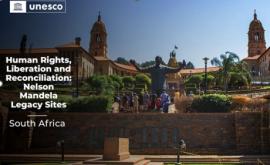
The Presidency has welcomed the latest inscription of South African human rights and liberation struggle sites in the United Nations Educational, Scientific and Cultural Organization (UNESCO) World Heritage Sites.
The sites – termed as The Human Rights, Liberation and Reconciliation: Nelson Mandela Legacy Sites – include the following:
- The Union Buildings
- Constitution Hill
- Liliesleaf
- Sharpeville (comprising three component parts)
- Walter Sisulu Square
- 16 June 1976: The Streets of Orlando West
- University of Fort Hare and ZK Mathews House (comprising two component parts)
- Mqhekezweni
- Waaihoek
- Ohlange
“Collectively, this serial property demonstrates the events and ideas that served as the core of South Africa’s liberation struggle, which continue to inspire humanity and the embrace of reconciliation, a quarter century later.
“The 14 components exemplify strong memories and beliefs in the triumph of human rights, liberation and reconciliation,” the Presidency said in a statement.
Furthermore, the UNESCO World Heritage Committee also inscribed three Middle Stone Age sites as “recognition of South Africa’s significant contribution to the understanding of the origins of modern human behaviour”.
The three sites, inscribed is The Emergence of Modern Human Behaviour: The Pleistocene Occupation Sites of South Africa, are:
- Diepkloof Rock Shelter close to Elands Bay, Western Cape
- Pinnacle Point Site Complex in Mossel Bay, Western Cape
- Sibhudu Cave in KwaDukuza, KwaZulu-Natal.
The addition of the two serial properties will bring South Africa’s number of World Heritage sites to 12.
The Presidency expressed “heartfelt gratitude to the members of the 46th session Committee for the honour bestowed to the country, its history and rich legacy”.
“The Presidency also acknowledges the members of the Africa Group and most importantly, the African World Heritage Fund, which is an intergovernmental organisation created in 2006 by the African Union and UNESCO to address challenges faced by the African State Parties in the implementation of the 1972 World Heritage Convention, specifically the under-representation of African sites on the World Heritage List and the insufficient conservation and management of these sites.
“The Presidency calls on all South Africans, spheres of Government, management authorities and heritage stakeholders to work in a coordinated manner to ensure that these precious treasures of humanity are safeguarded and optimally deployed to meaningfully contribute to sustainable development in communities and further entrench the values of human rights, freedom, peace and reconciliation,” the statement concluded. – SAnews.gov.za


